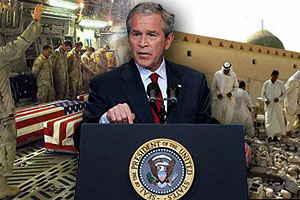02.04.2008
March 27, 2008 (the date of publication in Russian)
Alexander Sobko
THE JUBILEE OF THE IRAQI CARNAGE
Five years after overthrowing Saddam, US leaders learn to distinguish the Shi'i from the Sunni
 The fifth anniversary of the US intervention in Iraq, marked last week, is a good pretext for striking the preliminary balance of the campaign. Commentators provide all kinds of statistics, from the amount of war expenses (reaching today $500 billion that is $2000 per US citizen, including babies) to the number of irrelevant statements of George W. Bush. Still, the most impressive is the statistics of casualties. While the US Army has lost 4000 soldiers, the ordinary citizens of Iraq, killed in the civil conflict, range between 300,000 and 1 million, according to various sources.
The fifth anniversary of the US intervention in Iraq, marked last week, is a good pretext for striking the preliminary balance of the campaign. Commentators provide all kinds of statistics, from the amount of war expenses (reaching today $500 billion that is $2000 per US citizen, including babies) to the number of irrelevant statements of George W. Bush. Still, the most impressive is the statistics of casualties. While the US Army has lost 4000 soldiers, the ordinary citizens of Iraq, killed in the civil conflict, range between 300,000 and 1 million, according to various sources.
That is the price for freedom and democracy in accordance with the US scenario. The overthrow of Saddam Hussein justifies the subsequent carnage, as Mr. Bush acknowledged in his jubilee speech.
After the version of Iraq-possessed WMD was repudiated, the intervention is substantiated solely with the need of "salvation of Iraq from dictatorship, and the world from terrorism". However, the new concept is actually refuted by the latest Pentagon report that admits that Saddam's connection with Osama bin Laden is in contrary to fact, and that Al Qaeda hadn't been present in the country before the US invasion.
Despite the massive propagandist campaign, the true reasons for the US intervention were viewed differently already five years ago, being explained rather with corporate interests in Iraqi oil, along with the appetites for military contracts among companies close to the US Republican party. In addition, the US military community exploits the "managed chaos" strategy for securing US global domination by spawning hotbeds of tension across the globe.
However, it is possible that the US leadership really relied upon the option of a "small victorious war". There are enough grounds to suggest that Washington underestimated the significance of balance between the Sunni and Shi'i communities of Iraq. Top US politicians are not quite aware of this difference. Quite recently, leading Republican candidate John McCain kept accusing the Shi'i Iran of supporting the Sunni al-Qaeda until his assistant intervened to stop. A year ago, House Intelligence Committee's chair Sylvester Reyes failed to identify the religious identity of Al Qaeda and Hezbollah.
On the other hand, the Iraqi resistance is increasingly dominated by the secular Baath Party that had been barred from positions in the administrative and military cadres until recent time. Today, the Baath underground is steered by Izzat Ibrahim al Duri, head of Iraqi Revolutionary Command Council, a person identified as the "King of Clubs" in the stack of cards with portraits of wanted Iraqi politicians, issued by the US command.
Despite optimistic statements of the US leadership, Iraq is going to fall apart. Meanwhile, the US Republican leadership is greatly interested in fabricating a semblance of stability and preventing a new wave of destabilization before the Presidential elections.
Probably for that reason, The Iraqi Parliament has suspended the law barring civic and military employment of Baathists. This measure is supposed to reduce anti-American activities of the former Hussein's party.
Is the objective likely to be reached in this way? Radical Shi'i leaders have already expressed their dissatisfaction with exoneration of the Baathists. Months after the declared truce, Muqtada al Sadr's Mahdi Army resumed military activities against coalition forces and Iraqi government troops. Today, Sadr City, a 2-million suburb of Baghdad, and Basra, Southern Iraq, are swept with fierce battles. In the capital, rebels pelt the "green zone" with mortars and missiles, first casualties among Americans already being registered.
The third force, the Kurds, should not be overlooked as well. For years, they have been the most reliable allies of America, but after Washington blessed the Turkish crackdown upon PKK, the Kurdish loyalty has deteriorated, thus predetermining a new outburst of carnage in Iraq.
Number of shows: 1098
 ENG
ENG 

 ENG
ENG 
